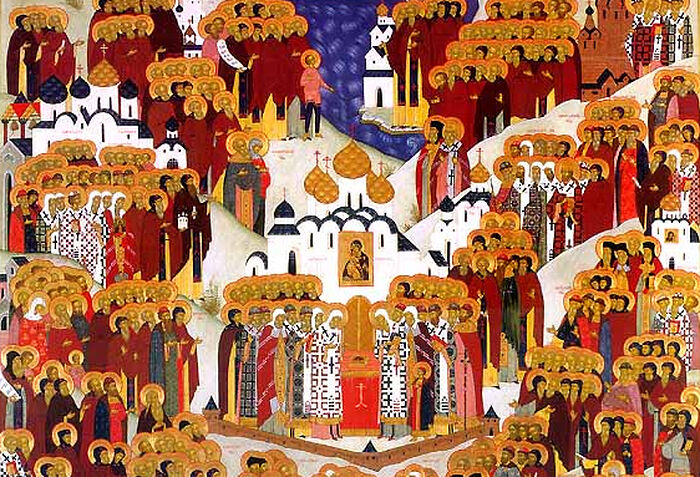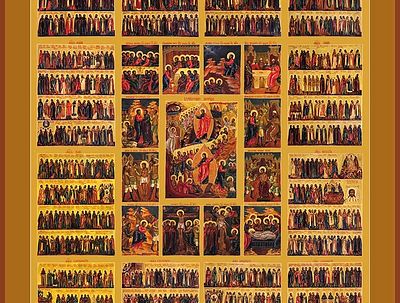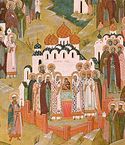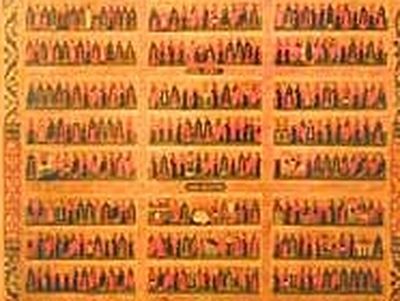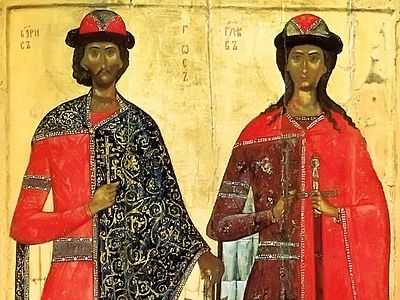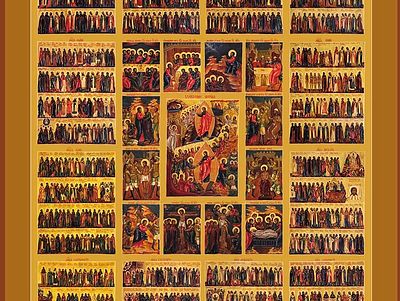In the name of the Father, Son and Holy Spirit!
We magnify Thee, O Three-hypostatic Master, Who hast enlightened the Russian land with the Orthodox Faith, and hast glorified our race amongst the hosts of saints.
Today, my friends, is Russia’s name day—the day we commemorate all the saints of the Russian land, by whose labors and sorrows, by whose magnitude of spirit, we are now Orthodox Christians. We celebrate this day once a year. But today this celebration of those saintly Russians who have pleased God is particularly grand, for one thousand years has passed since the Russian people were spiritually born by Holy Baptism, when the Lord looked down upon Rus’ and breathed the spirit of life into it.
This 1,000 year anniversary inspires us to look back at the road we have travelled, at our history, and to evaluate the events that happened so long ago, but by which Russia lives to this day. No one can deny this or underestimate it, regardless of his or her personal world view or religious confession. All celebrate together the religious, national, governmental, and cultural solemnity.
Contemporary scholars say that the history of Rus’ and all Russian culture began with the baptism of Russia. This is precisely why the whole world, “from the eastern sun to the west,” marks the 1,000 year anniversary of the Baptism of Russia.
Without me ye can do nothing, said the Lord (Jn. 15:5). How many tribes and peoples have disappeared into oblivion, while the Russians, nourished by the grace of the Holy Spirit given to them as a gift at Holy Baptism, became Great Russia. Russia did not receive the great Divine treasure formally; it labored, it made its mind and heart captive to God’s commandments.
Love thy neighbor as thyself; in this are all the law and the prophets (Mt. 22:39–40). How simple is the word of God, how good; but what sacrifice and labor are required to embody it in life. The 1,000 year history of Rus’ has shown the world that we can live only by this, only these words give us birth into life, feed us, raise us, and protect us. The Lord also preserves us, as long as we preserve the word of life—love.
Where did this begin, what were the experiences and historical developments, and who was the first to take this difficult path which leads us to Life Eternal? It is hard to encompass all of it, but we must at least remember the main thing.
In the first century, Christ, the Son of God, came into the world, and during only three years of His life and preaching, He showed the world new, hitherto unknown moral and spiritual values. A hymn of love! Love, even unto death! Love, even for one’s enemies!
Who can hear this; who can accept it? Twelve men, twelve Apostles, amongst whom was St. Andrew the First-Called. Think about it—only twelve men! But in truth, the Son of God was manifest to the world. For from one, even one Who died and arose again, was born something that shook and changed the whole world.
Christ died and was resurrected, and twelve obscure, unknown disciples of His went out into the world and brought the sparks of the new faith and teaching.
To the Ros tribes came an Apostle who saw Christ—Andrew. He raised a cross on the hills of Kiev, and by the grace of the Holy Spirit, said these powerful and true words: "On these hills will shine forth the grace of God.”
The Apostle Andrew pronounced the word—he sowed the seed. But how long did the Lord labor to make the seed grow; He Himself labored, unknown and unseen, in the darkness of a cruel, pagan world, amongst chosen people. History is silent about this. We now only see that in the tenth century, suddenly, like a splash, the equal-to-the-Apostles Prince Vladimir appears in the world.
Now we say that he is a saint, and his statue stands on the Kievan hills. With a cross in his hands, he looks out upon Rus’ and the fruits of his labors. Now he is a saint! But then, 1,000 years ago, he was a pagan prince who had pressed the limits of earthly pleasures in his life—unrestrained and crude in every way, a son of hell, if you measure him according to Christian understanding. He was literally an embodiment of the whole Russian past. His ascent to the first place amongst rulers was bound up with the murder of his own brother. How could he have been reborn as a new man?
But Christ reached him. Vladimir did not ask his unbridled flesh for advice, but rather turned full face to Christ and gave Him his heart, calling all of his people to follow after him. He said decisively and harshly, "Whoever does not come to be baptized is no friend of mine!” And all those loyal to their prince went, trusting in his choice; having understood the difference between the god Perun, who demanded bloody sacrifices, and Christ, the God of love for all people.
Understandably, human nature could not have changed immediately. People were still human, with all their human qualities and inadequacies; but God’s commandments were already resounding in them, binding the sin that still lived in their hearts, leading them to moral regeneration.
Rus’ accepted the way of the Cross, the path of severance from everything uncouth, from everything that chains people to the earth. The living example of Prince Vladimir, in whom all could see the miracle of transformation from a great sinner to a righteous man, called a whole, great people to life. Holy Prince Vladimir, glorified by this miracle, stands at the source of Christian Rus’.
To this day, the inheritance of the saint to his children, and that means, to us also, leads them and us through life to Life Eternal. Only receive it and live by it, only believe in it—especially since it has already been confirmed by one thousand years of life.
The holy baptizer of Russia says to us: “We are sinful and mortal people; if someone does evil to us, we want to swallow him up and hastily spill his blood. But our Lord, Who is master of life and death, endures our outrageous sins all His life… As a father spanks his child out of love for him and draws him once more to Himself, so also does our Lord show us victory over our enemies, and how to conquer them by three virtuous acts: repentance, tears, and mercy.”
The Russian people called their spiritual progenitor “Vladimir the Beautiful Sun.” This says it all: their obligation and gratefulness for the gift of warmth, joy, and life itself.
In the tenth century, from this God-pleaser and statesman, a new Rus’ begins, a new people, a new spirit, a new path, a new culture. If we now look at the life of the Russian people from Holy Baptism to the present day, we will see that Rus’ walked the path determined for it by the spirit and example of its baptizer.
Generation after generation has been born on the Russian land, and standing before the choice between two kingdoms, they chose the Kingdom of Heaven. They lived by it; and departing, left their descendants the lessons of their life’s path in the person of their saints. Nothing can draw and inspire as well as a good example; and no one can teach us so easily and joyfully to live the Christian life as well as someone who sincerely and joyfully works for Christ.
How many pleasers of God, prayerful intercessors, have there been in the Russian Land? They are numberless throughout the history of Russia; known and unknown, a multitude of holy men, women, hierarchs, wonder workers, princes, monks… They all manifest different qualities of Russian spirituality, but they are all related, in that they all drank of one spirit—the spirit of holy faith and Church piety, the Spirit of Christ.
The historical flow of Russian life has been varied: there were times of thunderous activity, there were lulls, and even complete halts. The river of Russian national life that gave birth to saints flowed in the given direction; this flow, however, was sometimes rapid and fruitful, sometimes slow, and sometimes so quiet that it was hard to tell whether it was flowing forward or backward. And now, 1,000 years later, we can mark the main periods of Russian religious history from the time of St. Vladimir to the present day.
There are six of them, and the seventh is approaching. These seven periods beg comparison with the seven Sacraments of the Church.
The first period, that of St. Vladimir, corresponds with the Sacrament of Holy Baptism. It was brief, but extraordinarily significant—the result of a root change in the life and consciousness of the people; the result of their longing for a new goal. It was birth by water and the Spirit. Then the first saints appeared—instructors in the true faith, and our intercessors before the Master.
Fruits worthy of their father’s sanctity were two sons of St. Vladimir—the first martyrs and blessed passion-bearers Boris and Gleb. Listen, O my friends, and see how the Grand Prince’s son, Boris, proceeds toward his cross: "My heart burns, my soul troubles my mind; I do not know where to turn, or to whom I may direct this bitter grief—should it be to my brother, who was like a father to me? But I think that he is now given over to worldly vanity, and contemplates my murder. If he resolves to kill me, then I will be a martyr before God, for I will not resist, as it is written, The Lord resisteth the proud, but giveth grace to the humble…” That is how this preacher of Christian meekness and non-aggression prepared himself for death.
The second period followed the first, and continued until the Mongol yoke. It corresponds with the Sacrament of Holy Chrismation. During this period, when the people matured, were healed of the remnants of paganism, and became confirmed in the religion of the cross, a rebirth of each Russian soul individually had to happen, and upon each the seal of Kingdom of Heaven had to be placed. Chrismation as a Sacrament signifies confirmation in the faith through the seal of the gift of the Holy Spirit. "The holy and great Lavra, begun by St. Antony, preaches Orthodoxy, and proclaims it more loudly than a trumpet.” How many memorable, exemplary works they did, those pleasers of God, the monks! Amongst them were chroniclers, artists, and unmercinary healers—doctors of souls and bodies.
The third period corresponds with the Sacrament of Repentance, for it takes place in slavery, tears and sorrow, under the Mongol reign. It was necessary to blow away the people’s sins collected during the time of freedom with the fierce wind of slavery. This difficult period was directed at the acquisition of the main goal—purification of the spirit from everything earthly, and choosing the Kingdom of Heaven.
During this period, the Lord also gave us men wondrous in life and mind, warriors of obedience, a host of holy hierarchs, Peter, Alexy, Jonah, and Phillip, a synaxis of monastic saints, and many others. Time is insufficient to number all the saints that appeared in Russia during that sorrowful period.
The fourth period begins with the end of the Mongol yoke until the time of Tsar Peter [the Great]. Freedom began with the battle of Kulikovo, where the right-believing warrior-prince Dimitry Donskoy manifested his greatness of spirit. National love for him and the grateful memory pronounced through the centuries have shown him today as a saint. This brilliant period of freedom corresponds to the Sacrament of Marriage. The national soul, purified by suffering, was betrothed and completely dedicated to its Heavenly Bridegroom. Christ now inseparably reigns over the Russian land, and the Russian land is adorned with numberless saints. This is the time of the wedding feast—the uniting of the people with God. During these centuries, more than a hundred scores of new saints arise before the Throne of God as intercessors for their people. Amongst them are monastics, bishops, princes, fools-for-Christ, builders, missionaries, and God-bearing fathers. It is a feast of faith.
The fifth period corresponds with the Sacrament of Unction. Historically it begins with Tsar Peter and continues up to the First World War. This is the synodal period, during which the Russian intelligentsia was corrupted and wavered in faith; they left Russia for the West and brought back foreign errors in place of their former virtues. The number of those who forgot God and chose the idol of an earthly kingdom grew feverishly. The idols that Holy Grand Prince Vladimir had crushed were revived in destabilized souls. The river of Russian religious life dampened its flow.
The sixth period is the one from the First World War to the present. This period corresponds with the Sacrament of Communion. Never before have the Russian people, the little flock, so sincerely united with their beloved Christ as they do now, when the unbelieving trample the sacred underfoot, when the prince of this world is allowed for a time to show his power and authority once more. The dark, evil spirit redoubles its efforts, but the Russian people commune, and especially cleanse themselves with suffering through a life of the cross, even more closely uniting them with Christ.
And if the Lord grants it, the seventh period will fill the vessels of Christian faith and sanctify the Russian people with His grace, which will give the people strength in the name of the Son of God to freely choose the Kingdom of God, the Kingdom of Heaven, again and again as the goal of life on earth. And this period will correspond to the Sacrament of Ordination. The Russian people will then become a holy people, a morning star amongst peoples.
However, my friends, no matter when we may live, the greatest good is the salvation of the human soul. This is the only goal of a person’s life, and the Lord cares only for the salvation of the priceless soul. During the most difficult periods of life, we see with amazement how the power of God is made perfect in our weakness, and we bow down before God’s greatness and the miracle shown by His Providence.
We needn’t look hard for examples. In 1917, when the order of Russian life that lasted many centuries was in its death agony, something unknown was being produced in pangs of birth. When everything was falling down around, the Lord placed His earthly Church upon the firm foundation of the Patriarchy. Take a look at this—it is a miracle, and the work of God’s hands! The earthly Church and the Heavenly Church are the body of Christ, and cannot but co-suffer in the sorrows and share in the joys of one or another member; and the Heavenly Church, the Church Triumphant and exultant, cannot but participate in another of its parts still living in confession of faith, and often, in suffering. Therefore, new heavenly ambassadors appeared in the Church—new saints, new prayerful intercessors, and new wonder-workers, who give us their spiritual energy and strength […]
The Lord is merciful—this is a feast of faith, given so that our hearts might not be troubled by any hardships of life, so that we would see that the Lord has not abandoned His Church, or us, its children; so that we might partake of its fruits, be inspired by the example of those who achieved the reward of the Heavenly Kingdom, and exult with the angels. Those saints of Russia who pleased God, both known and unknown to us but always known to God, are with us; they are always with us, and call to us, saying, "Learn, pray, ask.” The Lord will receive us, and they will receive us as brothers and sisters, as friends in the eternal joy of Christ’s habitations.
My friends, I congratulate you with this unearthly joy! Do not forget to pray to them, these new saints, especially now that they have shown forth in the power and magnitude of what the Lord has wrought in them.
Rejoice in the Lord ye righteous, praise is meet for the upright (Ps. 32:1).
My friends, today’s Liturgy was preceded by a solemn pannikhida at which we prayed to God for those who lived, labored, rejoiced, suffered, and departed on the way of all people on earth. After the Liturgy we will serve a festive moleben for the newly-canonized saints. We will pray to all the God-pleasers of Russia, whose earthly lives ended so wondrously, for it gave them the bright wings of Angels that carried them up to the throne of God; and we will ask them to pray for us. We will sing magnifications to them, and make a procession, so that everything living might share in our joy and present triumph. Let us ask the Lord’s blessing, and ask the all the Russian saints for their prayers at this entrance upon the second millennium, so that their prayers might not lessen in the Russian Orthodox Faith in all its purity; so that we and our descendents might not forget God’s commandments. Let us also give thanks to the Lord for the past millennium which now departs to eternity.
"Christ is enthroned, Christ is glorified. Great art Thou, O Lord, and wondrous are Thy works, and no word sufficeth to sing of Thy wonders!” Glory to Thee, our God, for all things, unto the ages of ages! Amen.
The saints canonized at the Local Council of the Russian Orthodox Church (Moscow Patriarchate) of 1988 are:
1. Right-believing Grand Prince of Moscow, Dimitry Donskoy (1350–1389).
2. St. Andrei Rublev (1360–the first half of the fifteenth century).
3. St. Maxim the Greek (1470-1556).
4. Metropolitan Macary of Mosow and All Russia (1482-1563).
5. Schema-Archimandrite Paisius Velichkovsky (1722–1794).
6. Blessed Xenia of Petersburg (late eighteenth to early nineteenth centuries).
7. Bishop Ignatius Brianchininov (1807–1867).
8. Hieroschemamonk Ambrose of Optina (1812–1891).
9. Bishop Theophan the Recluse (1815–1894).
May 30, (12 June) 1988
